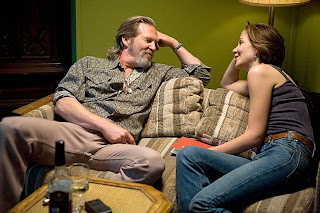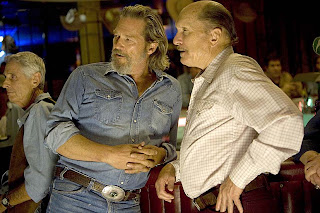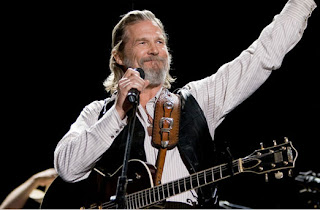The movie tells the story of Bad Blake, a 57-year-old country music legend who has fallen out of the public eye. Touring the country by himself in his '78 Suburban, he plays bowling alleys and dive bars to small crowds, barely making a living. He gives an interview to a reporter, Jean Craddock (Maggie Gyllenhaal), and their relationship provides the foundation for the film. Along the way, Blake reunites with a young country singer whom he once mentored.
Crazy Heart
Writer/Director: Scott Cooper
Starring: Jeff Bridges, Maggie Gyllenhaal, Robert Duvall
First-time feature writer/director Scott Cooper wanted to tell the story of Merle Haggard, but couldn't obtain the rights. So he turned to "Crazy Heart," a novel written in 1987 by Thomas Cobb. Cooper made a fantastic choice to tell the fictional story of Bad Blake because, unlike the typical biopic, we don't know how this story ends. We don't enter into this film carrying our own bias for or against an actual musician that inhabits our world. We aren't subconsciously questioning why the director didn't include what we perceive as milestone events in the main character's life because we don't have any prior knowledge of this character. At the same time, by basing him so closely on the lives of Merle Haggard, Kris Kristofferson, and other country legends, Cooper easily tapped into our expectations for Bad Blake. We instantly pinpoint this character and his situation, and from the first frame of the film can recognize his story. Cooper gave us what appears to be a blank slate, but upon closer inspection already has outlines drawn out for us.
But what might be one of the film's best strengths is also a potential weakness. By delving a little too far into the derivative, the movie can feel overly familiar and loses its way at certain points, meandering until it hits plot points that move the story forward. While I initially thought these wandering segments of the film weren't as important, in hindsight I've been given a new perspective: I think the movie was designed this way on purpose. By including the relevant with the seemingly irrelevant, we're given a much more realistic look into Bad Blake's character and can extrapolate his life story out of these moments without a single flashback in the entire film. Sure, there are some borderline stereotypical aspects - surrogate sons, rehab, etc. - but the movie also feels startlingly real at times, and the characterizations (not just Bridges, but supporting characters) lend an air of authenticity that makes Crazy Heart one of my favorite movies in this genre.
Allow me to briefly add to the growing chorus of supporters for Jeff Bridges and his work here. He completely disappears into this role, and definitely earns every bit of praise he's getting. Similar to Joaquin Phoenix in Walk the Line, Bridges himself actually sings in this film and sounds pretty convincing as a country performer (after I saw the film, I went home and downloaded one of the film's songs from iTunes - something I NEVER do). But how this film differs from Walk the Line is in the details - an interview with Scott Cooper reveals that Bridges and Co. actually sang live on set as well as in a studio, and Cooper used the audio of the live performances whenever possible. This adds yet another level of realism to the production of this film; one that you can feel on the screen and unquestionably hear through the speakers.
The music is fantastic, and every song sounds as if it could be heard on the radio. This, I'm sure, is thanks to T-Bone Burnett, a music producer who has worked on such albums as The Wallflowers' "Bringing Down the Horse" and contributed to Crazy Heart as a music producer and songwriter. "The Weary Kind," the theme for this film, earned Burnett (along with fellow composer Ryan Bingham) an Academy Award nomination for Best Original Song in a Motion Picture.
Through all the praise I heard about this film before I saw it, I heard almost nothing about Maggie Gyllenhaal's performance. She's since been nominated for Best Actress at the Academy Awards, and this is without a doubt the best work I've seen from her. (To be fair, I haven't seen Sherry Baby or Secretary.) We never get to explore Jean's work as a journalist, instead primarily focusing on her much more important job of being a mother. Gyllenhaal appeared at a Q&A after my screening, and said she approached the character as a good mom who allowed her son the security of knowing that she's always nearby. Adding yet another level of realism to this film, the mother/son relationship between her and 5-year-old debut actor Jack Nation was believable and sincere. Gyllenhaal captures the essence of both responsible parent and free-spirited lover with ease, and is equally effective in the quiet moments as in the few emotional outbursts her character experiences.
One of the most complex relationships depicted in this film is between Bad Blake and Tommy Sweet, the young heartthrob country superstar whom Bad mentored years prior. I'm not going to give away who plays Tommy in the film, but it's a great surprise since this actor hasn't appeared in any of the marketing. If you plan on seeing this movie, don't read anything else about it before you hit the theater - other websites surely won't be so kind about hiding the spoiler. Robert Duvall (who produced the film) appears as a friend of Blake, and does solid work with a small role (as if there were any doubt).
Crazy Heart is a small film that needs your support. It's refreshing to see a movie crafted with such passion on every level, and to see that passion translated through the big screen. If the current reboot/sequel trend is any indication, the days of seeing small films like this in theaters are unfortunately numbered. I'd highly suggest checking out Crazy Heart if you get a chance. I'd normally say it's not a film that demands to be seen in theaters, but if you prefer having choices that don't involve adaptations of 80's television shows when you visit a multiplex, then supporting a film like this is the only chance we have. Until next time...
BELOW: A NOTJUSTNEWMOVIES EXCLUSIVE!
One of my favorite lines in the film comes during Gyllenhaal's interview with Bridges. She asks, "What would you have done if you didn't make music?" and he responds, "Play baseball. I used to play, and was pretty good, too. I just couldn't hit the curveball. So I figured I'd stick with playing my guitar - the sonofabitch stays where it belongs."





No comments: